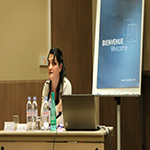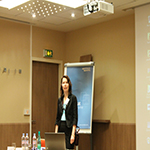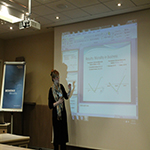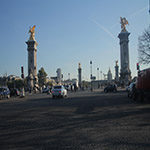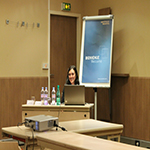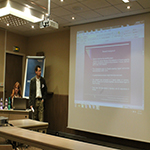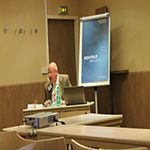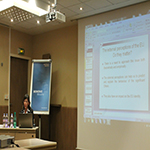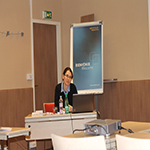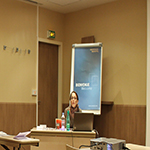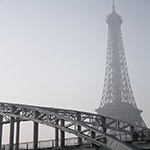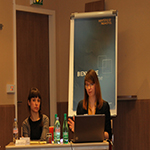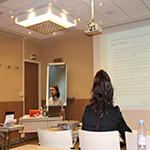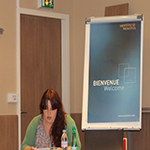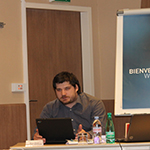Book Presentation by Martin Rodan
Notre Culture Européenne, Cette InconnueHotel Novotel Tour Eiffel
61 Quai de Grenelle, 75015 Paris, FranceConference program
- April 27, 2012
- 09:30 - 10:00Registration (Reception Desk, Hotel Novotel Paris Tour Eiffel, Foyer)
- 10:00 - 10:30Welcome and Opening Remarks
- 10:30 - 11:00Coffee Break/Snacks
- 11:00 - 13:00Open Floor Workshop: Debating Europe. With a book presentation by Martin Rodan: Notre culture européenne, cette inconnue, Peter Lang 2009
- 13:00 - 14:30Lunch – Restaurant Hotel Novotel Paris Tour Eiffel
- 14:30 - 16:30Panel 1 – The Politicized Europe and the EU: From a Regulatory Body to a Contested Post-National Cosmopolitan Order (Chair Emanuel Crudu)
- 16:30 - 17:00Coffee Break/Snacks
- 17:00 - 19:00Panel 2 – Europe and Its Internal/External Others/Outsiders (Chair Ray Steenkamp Fonseca)
- April 28, 2012
- 09:30 - 11:00Panel 3 – Europe in the World – From Conflict Resolution to a Normative Power (Chair: German Mendzheritskiy)
- 11:00 - 11:30Coffee Break/Snacks
- 11:30 - 13:30Panel 4 – Europe and Identities (Chair Ekaterina Bagreeva)
- 13:30 - 15:00Lunch – Restaurant Hotel Novotel Paris Tour Eiffel
- 15:00 - 17:00Panel 5 – Culture and Arts in Shaping Europe (Chair Martin Rodan)
- 17:00 - 17:30Coffee Break/Snacks
- 17:30 - 18:30Closing Session: Open Floor Discussions and Remarks
- 18:30 - 21:00Optional Social Program: Networking and Socialization
- April 27, 2012
The Second Euroacademia Global Conference – Europe Inside-Out: Europe and Europeaness Exposed to Plural Observers

- Conference Description
- Participant’s Profile
- Registration and Fee
- Social Activities and Publication
- Important Dates
- Venue and Directions
- Panel 1
- Panel 2
- Panel 3
- Panel 4
- Panel 5
The Second Euroacademia Global Conference Europe Inside-Out: Europe and Europeaness Exposed to Plural Observers
Paris, 27-28 April 2012
Application was closed on 15 March 2012
Europe became in the 20th century an elaborated yet contested notion as a particular field of European studies emerged and extensive and diverse research was directed recently towards an intensified search for what Europe is about. The creation of the European Union made things even more specialized and increased the stake of methodological rigor as more and more Europeans are affected by the decisions taken in Brussels. The number, diversity and quality of research projects focused on European issues is unprecedented, yet, as it is usually the case with specialization it gradually led to discursive communities that rarely meet and debate their approaches in open floors together with peers from other continents, academic traditions and cultures. It is the aim of this conference to build a bridge among specialists from different regions, academic traditions and cultures that share a common interest in studying and addressing Europe as a reflexive concern.
The Second Global Conference ‘Europe Inside-Out: Europe and Europeaness Exposed to Plural Observers’ aims exactly to refresh a broader approach and understanding of Europe by enlarging the platform of regular conferences and workshops for a wider arena of participants and disciplinary backgrounds in order to put on stage a worldwide monadology for such concerns. The conference aims to enable critical alternatives to the disciplinary orthodoxy by creating a framework for interaction and dissemination of diversity that has to become once more a European trademark. The conference also aims to become a constructive confrontational space for alternative methodologies, provocative puzzles, inter, multi and trans-disciplinary understandings for wider and also for thinner specialized issues of concern on or about Europe of today. In a way, such a conference aims to become a moment of return to the European specificity of critical self-understanding through dialogue and debate with all the discursive or narrative traditions that directly or indirectly constitute its self.
What is Europe and its place in the world? Is there something particular that sedimented in time and through a controversial history a European way? How does Europe see itself and how do others see it? Is Europe inclusive or club-based exclusive? Is Europe becoming a normative power or just envisages itself as one? Is the European multiculturalism a fact or an ideal? Is the European Union a reflection of Europe or an appropriation of it? These are just few questions out of an enormous space for inquiry that are to be addressed and confronted within the topic of the conference.
Participant’s Profile
The conference is addressed to academics, researchers and professionals with a particular interest in Europe and European Union from all parts of the world. As the nature of the conference is intended to be multidisciplinary in nature different academic backgrounds are welcomed.
Post-graduate students, doctoral candidates and young researchers are welcomed to submit an abstract. Representatives of INGOs, NGOs, Think Tanks and activists willing to present their work with impact on or influenced by specific understandings of the European Union are welcomed as well to submit the abstract of their contribution.
Abstracts will be reviewed and the participants are selected based on the proven quality of the abstract. The submitted paper for the conference proceedings is expected to be in accordance with the lines provided in the submitted abstract.
Participation fee: 295 Euro
The participation fee includes:
- the registration fee,
- all the materials of the conference
- a copy of the electronic volume to be published
- access to Euroacademia discussion group and newsletters
- discounted rates for participation in the future Euroacademia conferences
- coffee brakes with snacks for all the duration of the conference
- a 3 course lunch on 27th of April 2012
- a 3 course lunch on 28th of April 2012
- optional social program – visit at the museum
- certificate of attendance
Please be aware that the final confirmation of attendance will be considered upon payment of the participation fee until the 30 March 2012 in the Euroacademia account:
Euroacademia
Credit Mutuel
IBAN: FR7610278060470002073210155
BIC: CMCIFR2A
Branch PARIS 17 ETOILE – 30 AVENUE NIEL 75017 PARIS FRANCE
The participation fee can be paid only through bank transfer. A confirmation of receipt will be sent to you by e-mail and the original invoice will be delivered to you on site at the conference.
Unfortunately, Euroacademia has no available funds for covering transport and accommodation in Paris. Participants are responsible for finding funding to cover transportation and accommodation costs during the whole period of the conference. Official letters can be sent by Euroacademia to the financing institution to confirm the selection and participation in the conference upon request.
A specific spot in the conference program will be dedicated to social networking and therefore all the participants interested in setting or developing further cooperation agendas and prospects with other participants will have time to present and/or promote their project and express calls for cooperation.
A specific setting (Social Corner) for promotional materials connected with the topic of the conference will be reserved for the use of the participants. Books authored or edited by the participants can be exhibited and promoted during the whole period of the conference and can also be presented within the conference package based on prior arrangements.
An optional dinner and a social event will be organized for the second evening of the conference in a typical Parisian Restaurant as optional program for the willing participants. The social dinner will be held based on participant’s confirmation and it costs 50 Euro to be covered by participants.
Publication:
Selected papers will be published in an electronic volume with ISBN after the confirmation of the authors and a double peer-review process based on an agreed publication schedule. All the papers selected for publication should be original and must have not been priory published elsewhere. All participants to the conference will receive a copy of the volume.
Specific selected papers will be also published in CEJISS (Central European Journal of International & Security Studies)
About CEJISS
Formally launched in January 2007, CEJISS is designed as a double-destination scholarly bridge. The first bridge was constructed with Central Europe (Czech Republic, Hungary, Poland and Slovakia) in mind, focusing on increasing the audience for Central European scholars. In this regard, CEJISS is making a substantial impact as each issue attracts attention in some 45,000 people in nearly 160 countries. However, CEJISS is not Central European centric and invites scholars from around the world to contribute. This has meant that just as Central European scholars now have an easier time gaining a footing outside of the region, so international scholars also have an easier time getting in and making an impact here. With a mere two decades separating our times from the ‘darker’ Cold War years, CEJISS aims to contribute English language perspectives to the peoples of Central Europe and give the latter the amplification their research deserves.
| Important Dates | |
|---|---|
| 15 March 2012 | 300 words abstracts and details of affiliation |
| 20 March 2012 | Notification of acceptance |
| 25 March 2012 | Sending the participation form |
| 30 March 2012 | Payment of the conference fee |
| 10 April 2012 | Sending the draft paper to be uploaded on the web site of the conference |
| 15 April 2012 | Publication of the conference program and uploading the draft papers on the website |
| 27 April 2012 | The conference commences |
The conference will take place in the events premises of the exclusive 4 stars hotel Novotel Paris Tour Eiffel, located in the heart of Paris, overlooking the Seine and just two minutes walk from the Eiffel Tower.
 Hotel Novotel Paris Tour Eiffel
Hotel Novotel Paris Tour Eiffel
61 quai de Grenelle
75015 PARIS
FRANCE
Discounted rates for specific hotels can be arranged by organizers and announced to selected participants upon request.
The Politicized Europe and the EU: From a Regulatory Body to a Contested Post-National Cosmopolitan Order
(Chair Emanuel Crudu, IMT Institute for Advanced Studies, Italy)
- Re-Negotiating European Identity in Times of Economic CrisisThis paper analyses the recent debates on the euro-area crisis, particularly the Greek bailout discussions, with the aim of shedding light into ongoing constructions of a collective European identity. Discourses and the politics of representation surrounding the Greek debt crisis show us the invalidity of characterization of the EU as a post-modern collectivity.Beyza Ç. Tekin, Galatasaray University, Department of International Relations, Istanbul, Turkey
- European Parliament as a Cosmopolitan ParliamentThe uniqueness of the European Parliament among other parliaments in the world consists in its cosmopolitan character manifested in many ways. Firstly, the political groups in the European Parliament are transnational structures organized by political affiliation and not by nationality. However, political groups are made up of national delegations, and the heads of national delegations are important interlocutors for the chairs of the political groups.Helena Koutchoura, University of Strasbourg, Groupe de Sociologie Politique Européenne
- Shall EU Survive? EU on the Verge of Balkanization: The Impact of Economic Theory and Economic Policy on the Future of EUThe future of the EU seemed fogy at the end of 2011. The EU might eventually prove efficient and able to survive discovering its own and new way out of the ongoing crisis. Flexible markets and neoclassical economic paradigm might become a new economic and political fashion within the EU.Dragoljub Stojanov, Department of Economics, University of Rijeka, Croatia
- Does Morality and Culture Matter in the Identity of European Business?With the constant strengthening and emphasis on open internal markets in Europe, there is an increased focus on doing business across borders in a socially responsible way. This implies a challenging question: Does morality and culture matter, and what place do these aspects have in the value system and identity of contemporary business people from Europe and Russia?George Yuryev and Ekaterina Bagreeva , Institute of Philosophy of the Russian Academy of Sciences and The Russian Economic University of G. V. Plekhanov, Moscow
- New Governance and Neofunctionalism: Assessing Regulatory Regionalism as a Critical Juncture for Regional IntegrationWhile some scholars have called for a reassessment of neofunctionalism, little theoretical work has been done to study the potential conditions that could contribute to the project of building a rigorous, cutting edge model that could demonstrate the link between spillovers and regional integration. By looking at the concept of regional regulatory regionalism, the paper proposes to integrate public policy and international relations literature. The paper argues that potential regional integration, or disintegration, takes place at the critical juncture of regulatory regionalism.Alvin Almendrala Camba, University College London
Europe and Its Internal/External Others/Outsiders
(Chair Ray Steenkamp Fonseca, Visiting Fellow, Centre d’études européennes de Sciences Po)
- The Youth Discourses on EU-ropeanization in the New European Countries vs. the Margins of EuropeIn the proposed paper I discuss the perception of EU-ropeanization among the youth from the new European countries (the cases of Romania and Poland) vs. the margins of Europe (the case of Georgia). Based on my recent cross-cultural qualitative research, namely, the in-depth interviews and focus group discussions with Georgian, Romanian and Polish youth, I aim to illustrate how the EU-ropeanization discourses uphold the ambivalent identities promoting the construction of certain reality, in which the young people constantly negotiate between the EU-ropeanizing forces and the national.Lia Tsuladze, Tbilisi State University, Georgia
- “My Russian Speaking Neighbour – Who Are You? Why Are You Here?” The Different Roles of the Diaspora in the Integration Process of Russian-Speaking Migrants in Germany and NorwayIn our report we compare and analyze the role of the Diaspora in overcoming identification crises of Russian speaking migrants in Germany and Norway. The Russian-speaking Diasporas of Germany and Norway have completely different modes of ethno linguistic vitality (M. Ehala 2011), impacting the integration processes of its members. According to the analyzed data, different reasons for and ways of migration led to the formation of different types of Russian-speaking communities in these countries.Ekaterina Bagreeva and German Mendzheritskiy , Russian Economic University of G. V. Plekhanov, Moscow and University of Applied Sciences and Arts, Dortmund, Germany
- The Role of “the Other” in Jacques Derrida’s Perception of the European IdentityThe deconstruction of Jacques Derrida and his concept of "différance" seems to me particularly appropriated for a thorough examination of Europe and Europeaness exposed to plural observers. Derrida considered himself a real European because of his double internal and external appurtenance to Europe. He considered himself to be a European insider because he came from outside. He wrote in this context: "I feel, European in every part, that is, European through and through. By which I mean, by which I wish to say, or must say: I do not want to be and must not to be European through and through, European in every part. Being a part, belonging as 'fully a part,' should be incompatible with belonging in 'every part.'Martin Rodan, Hebrew University of Jerusalem, Israel
- The Role of External Perceptions in the European Identity FormationWhile the overwhelming number of scholars has come to the conclusion that the EU is an actor, the EU´s identity defies easy classification. One of the few points that scholars seem to agree on is that the EU is definitely a distinctive actor. However, the research has tended to be self-reflexive and the EU-centered because the Other´s perspective has been widely neglected, despite the fact that the Other´s role in the European identity formation has been acknowledged.Irina Khayrizamanova, Institut Universitari d’Estudis Europeus, Universitat Autònoma de Barcelona
Europe in the World – From Conflict Resolution to a Normative Power
(Chair German Mendzheritskiy, University of Applied Sciences and Arts, Dortmund, Germany)
- The EU Normative Power Oscillating Between Autonomous Values and Hegemony: The Emerging Principles of EU Exclusiveness and Supremacy Over International Treaty RegimesThe non legalistic discourse about the EU’s external normative power in exportation of its values and norms raise fundamental concerns for coherence of international law. The overarching aim of this paper is to scrutinize the EU normative authority through optics of international law, where the EU inner developments and integration create external implications for international law.Kushtrim Istrefi, Graz University, Austria and the University of Prishtina, Kosovo
- ASEM: Interregionalism In Evidence of Normative Power EUrope?Starting from 1990s the European Union has explicitly declared its interest in supporting regional integration in different parts of the world and has included these interest into its external policy under the framework of the Common Foreign and Security Policy. In the same period the European Commission published a document titled “Towards a New Asia Strategy” which was interpreted as the European ‘rediscovery’ of Asian region. It was based on one of the foreign policy goals of protecting the EU’s interests and values. This sudden attention paid by the EU to Asia resulted later on in the establishment of the Asia-Europe Meeting, the so-called ASEM.Roza Smolinska, Independent Researcher, Brugge, Belgium
- The European Union Common Security and Defence Policy Re-visited. EULEX-Kosovo a Test for a Common Peace Educational PolicyThe application of EULEX (European Union Rule of Law) in Kosovo has been so far the largest ever civilian mission deployed by the European Union, as part of its Common Security and Defence Policy (CSDP). Its main responsibilities per mandate (Council Joint Action 2008/124/CFSP) are to monitor, mentor and advice the local authorities in the police, justice and customs field and it is the first EU CSDP mission to be endowed with ´some executive powers´. Parallel to these peace-building functions, EULEX is also deemed to ´further strengthen and develop multi-ethnicity´.Nicasia Picciano, University of Flensburg, Germany
- Theoretical Perspectives for the EU Presence in the UN Institutional StructureThe European Union has its own specific approach towards multilateralism. It seeks to pool sovereignty and create a common foreign policy in many policy arenas. The EU has the potential to be an important power in shaping global events. However, the EU has exploited this potential more in the economic sphere than in the political and security spheres. Through the Common Commercial Policy the EU has used its power to promote global free trade and promote itself as the world’s largest trader. On the other hand, the EU has been less capable of speaking with a single and reliable voice on global political and security issues. The need for the EU presence in the UN institutional structure can be explained by a range of theoretical perspectives.Julija Brsakoska Bazerkoska, Cologne University, Germany and Law Faculty in Skopje, Macedonia
Europe and Identities
(Chair Ekaterina Bagreeva, Russian Economic University of G. V. Plekhanov, Moscow)
- Unifying or Disuniting? Media Interferences in Shaping IdentitiesAffirming an identity is the result of a consensus, and media seem to be the most efficient keeper of today’s consensus. This paper will try to challenge some identitarian stereotypes that have been circulated lately in SE European countries. Media, as a mass purchaser and provider of stereotypes, have responded in most cases after 1989 as a spokesman and defender not of its receptors, but of the stereotyped imaginary providers from Western countries.Dorin Popa and Alina Popa, Department of Journalism and Communication Sciences, „Alexandru Ioan Cuza” University, Iasi, Romania
- Euroscepticism Amongst Youth in Serbia and Croatia As An Extreme Form of Strategic CoalitionAfter the disintegration of the Socialist Federative Republic Of Yugoslavia, newly formed nation-states constructed their nationalistic ideologies in reflection to the Western World. While Serbian national identity was formed in an opposition to the western discourse, Croatia based its nationalism on the continuity within its independent presence in Europe. Today, twenty years after the separation, both countries went through transitional processes, mostly generating its legitimacy through EU integration.Astrea Pejović and Jovana Papović, Faculty of Politics, University of Belgrade, Serbia
- European Media Culture, Identities and Paradoxes of Cultural GlobalizationThe local and the global, as explained by theorists of cultural globalization (Robertson, Giddens and Waters) are not mutually exclusive but there are two dimensions of dialectical opposition to the uncertain process of a global culture. The local must be understood as an aspect of the global and globalization as highlighting the creative association of local cultures. At the time of postmodernism, according to the proposal of Roland Robertson, we face the replacement of the concept of cultural globalization with a new amalgam - glocalization, which is a combination of the words global and local.Liljana Siljanovska, South East European University, Tetovo
- The EU and Collective Identities: What Use For A EUropean Identity?The advance and transfiguration of the initial project of an ‘ever closer union’ brought about and intensified the searches and disputes on and around the idea of an emergent European identity. However the search for the substance, determinants, manifestations or specific features of such an identity opened the way for the image of an ‘identitarian Babel’.Emanuel Crudu, IMT Institute for Advanced Studies, Italy
- How cosmopolitan is European Identity? The data show the prevalence of the European identity is not high and it is considerably lower than the national one in most of the cases. At the same time, according to this study, Europe’s cores the highest in the level of cosmopolitan identity.Alexander Kustov, Laboratory for Comparative Social Research
Culture and Arts in Shaping Europe
(Chair Martin Rodan, Hebrew University of Jerusalem, Israel)
- Following the Origins of Art Video: Artist and New Techniques in European ArtThe idea of a group of people of all nationalities, who are not artists in the classical sense (among them we found industrialists, engineers or architects) aiming to create a global art by the use of the Medias in the art process. With Nam June Paik, John Cage, Vostell, the status of the artist is no longer associated with the museum, but with the world in general, a world in which political boundaries are not identical with those of culture. In this article, I would like to retrace the historic events that made possible the birth of video art in Europe, pointing out the importance of media development. Not only that Fluxus was a revolutionary form in the history of art, but it also announced the social effects of globalisation.Ioana Predescu, Ecole des Hautes Etudes en Sciences Sociales, Paris
- Images and Chimeras: The Role of Images in the European Society and in Iconographic TraditionsThe European contemporary society, the result of the digital revolution, is a new society, based on the image. Today we use images at a scale as never before, for universal communication, and as an instrument of production and diffusion of knowledge. Although, the research in the field of the theory of knowledge is based just on the discursive and linguistic type of knowledge, and the researches on the power, the effect and the function of images are still marginal.Victor Anches, École des Hautes Études en Sciences Sociales, Paris, France
- Online Diffusion of Culture as Practice of European CitizenshipThis paper frames online diffusion of culture, produced in response to European integration, as practice of European citizenship. It claims that such culture introduces new symbolic repertoires of being European in the post-national milieu. Dissemination of cultural objects and the making of transnational networks of agency in the virtual sphere are investigated as examples of cultural production constitutive of contemporary experiences of European belonging.Roch Dunin-Wąsowicz, London School of Economics and Political Science












